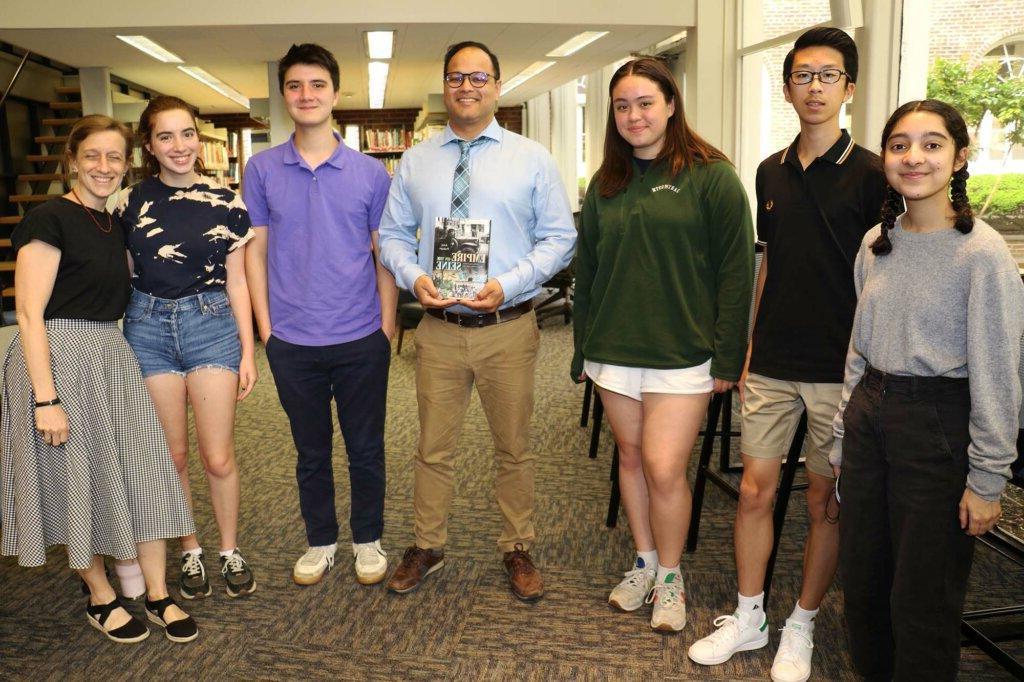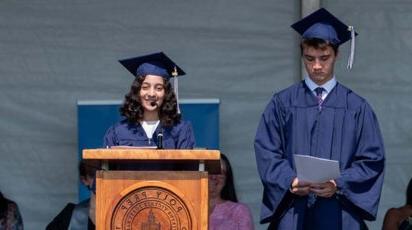新闻

How does a question turn into a book?
保利欢迎博士回来. 阿米特·普拉卡什报道 PolyContext speaker, who chronicled the research that resulted in his recently published book Empire on the Seine: The Policing of North Africans in Paris, 1925-1975.
Before the PolyContext presentation, Dr. 普拉卡什会见了该组织的成员 历史俱乐部, several of whom have won New York City and state honors for their own history research.
PolyContext
历史系系主任 玛吉Moslander 提供一些背景知识 PolyContext, a speaker series that was introduced in 2018. 米甲Hershkovitz P’16, ’18, Assistant Head of School, 学者, introduced Dr. 普拉卡什, who she described as a “gifted scholar.” She noted that besides teaching at Poly from 2013-16, Dr. 普拉卡什曾在哥伦比亚大学任教, 布林莫尔, 和三一, as well as co-hosting a podcast with his brother-in-law, “餐桌上没有政治.”
Curiosity Drives the Quest to Understand
Dr. 普拉卡什开始讲话, 《一个问题如何变成一本书,” by saying that research is “organized curiosity,” a “bee in your bonnet… you need to follow.”
During his junior year at Oberlin College, 他说, 他发现自己到了斯特拉斯堡, 法国, 这里是土耳其移民的主要地区. He 说, “Everyone in Alsace assumed I was Algerian,” which he is not. He quickly saw that the Algerian was seen very differently in 法国. “Every society produces its others,” 他说. “Nationalism creates an in group and out group right away.” Ironically, in 法国, “race is banned from being a category” of identity.
历史 of Policing of Algerians in 法国

In researching the policing of Algerians in Paris, Dr. 普拉卡什 spent a year in the French police archives, although he noted that today access to these records would no longer be open. 他描述了一个北非旅, which policed predominantly North African neighborhoods in Paris. Over time the name of this contingent changed, such as to the Night Security Brigade, 但它的目的却没有. He traced this policing over 50 years through anti-Semitism, 维希法国, 殖民主义, 和后殖民主义, and connected policing with surveillance.
Dr. 普拉卡什 also discussed connections and comparisons to the history of policing in the United States, noting that prior to the mid-nineteenth century there were no “police” in New York City.
Dr. 普拉卡什 made a very interesting point about the role of history when he quoted from the work of historian Marc Raeff, 秩序良好的警察国家, 1975 “…[T]he past is much more tenacious than public opinion imagines it to be. Little of the past is ever fully lost, though its dynamic role may change and its forms be transmuted.”
青年历史学家小组
历史俱乐部 members and the audience had questions for Dr. 普拉卡什. Afterward the students shared their impressions of the PolyContext talk and their earlier conversation with Dr. 普拉卡什.
“在他的演讲中,”他说 威廉·凌里根,1924年, “as well as the conversation we had with him in 历史俱乐部, Dr. 普拉卡什 talked about how he connects his historical research with other disciplines. I’ve tried to do this in my work for 历史俱乐部, so I really appreciated his thoughts on how his own work intersects with sociology, 警察和军事研究, 甚至是建筑, as they provided inspiration for how to connect history to my other interests.”
“I found it interesting how closely Dr. 普拉卡什 related policing of North Africans in Paris to policing in the United States,” 玛丽莎·特里奥拉,24岁 说. 当他解释这些联系时, I felt that I not only learned about the policing of North Africans in Paris, a topic which I previously knew little about, but I also gained insight into policing in the United States.”
“I found his analysis of the racial aspects of the policing of North Africans in Paris to be particularly interesting,” 姚奕迅25岁 说. “Despite 法国’s reluctance to officially recognize race as a category, the policing of North Africans was highly racialized. Not only were Algerians treated much worse than the general population, even those who looked Algerian were often asked for their papers, revealing the hypocrisy of 法国’s policy.”
“I was really inspired by how he turned something as small as a visit to Paris into a research paper and eventually a book,姚说. “It gave me the belief that quality research can stem from personal interests or experiences. In the future, I hope to connect my historical research to my own experiences and the current world.”
Ling-Regan added, “I was most surprised and interested by the link Dr. 普拉卡什 drew between policing, enforcement of social order, and post殖民主义. He talked about how policing can replicate the conditions of colonization, both within the colonies and within the imperial country, 这是我以前从未想过的. His talk helped me to see connections between the history he wrote about and my history classes at Poly, from learning about post殖民主义 in Postcolonial Southeast Asia to learning about state power and social order in Protestant Reformation and Democracy and Conflict.”





